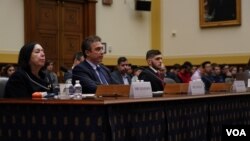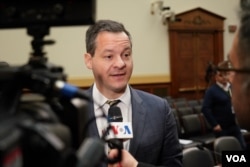U.S. lawmakers are making a renewed bipartisan effort to pressure Iran into freeing at least four Americans and a U.S. permanent resident viewed by Washington as hostages of the Islamic Republic.
A House Foreign Affairs subcommittee held a hearing Thursday in which family members of some of those perceived as hostages in Iran briefed lawmakers on the status of their loved ones. The subcommittee’s Democrat chairman, Congressman Ted Deutch, and top Republican, Congressman Joe Wilson, also used the hearing to announce their joint introduction of two congressional measures aimed at securing the freedom of those detained or missing in Iran.
One is a resolution that calls on Iran to unconditionally release U.S. citizens and legal U.S. permanent residents being held for political purposes.
The other is a bill that the lawmakers say would empower the U.S. president to impose sanctions on American hostage-takers. It also calls for elevating the role of U.S. Special Presidential Envoy for Hostage Affairs to the rank of ambassador.
More tools for president
In a statement, Deutch said the Robert Levinson Hostage Recovery and Hostage-Taking Accountability Act, named in honor of an American who went missing in Iran 12 years ago, is meant to give the Trump administration “more tools to pressure countries to return Americans to their families.”
Besides Levinson, whose family believes Iran has detained him, Iranian authorities have jailed Iranian-Americans Siamak Namazi and his father, Baquer Namazi, Chinese-American Xiyue Wang, and Lebanese U.S. permanent resident Nizar Zakka. Iran has said little about them beyond the alleged security offenses for which some have been charged. Relatives say the five have done nothing wrong.
Addressing the hearing, Deutch said he was concerned that the Trump administration’s 2018 withdrawal from a world powers’ nuclear deal with Iran and the lack of U.S. contact with Iranian officials could slow efforts to bring back U.S. citizens and permanent residents.
“I urge President Trump to sit down with each of these families, hear their stories, understand their suffering, and then take bold action to return their loved ones,” he said.
Wilson told the hearing that the bill would impose sanctions on Iranian individuals and entities responsible for the detentions.
“Iran has been taking hostages as a matter of policy and we must force Iran to change its behavior,” Wilson said. “We need to see an intense, concerted effort from Congress and the (Trump) administration to seek the release of our Americans who are being held in Iran.”
A previous bipartisan bill introduced by Deutch to punish Iran for perceived hostage-taking and human rights abuses passed the House last year but did not get to a vote in the Senate.
Family's 'living nightmare'
In her testimony, Bob Levinson’s wife, Christine, said her family “continues to receive reports that he is alive” but did not elaborate. Bob Levinson, whose 71st birthday would be this Sunday, disappeared March 9, 2007, while visiting Iran’s Kish Island as a private investigator. He had retired from a 22-year career with the FBI nine years earlier.
“We are all suffering a living nightmare,” Christine Levinson said. “My children and I have trouble sleeping. We wonder endlessly what kind of conditions my husband is living through.”
Christine Levinson and her seven children have been campaigning to try to locate him since his disappearance. Iranian officials have denied knowledge of his whereabouts.
Babak Namazi, the son and brother of detainees Baquer and Siamak Namazi, told the lawmakers that his elderly and ailing father is on a temporary medical furlough from Tehran’s Evin prison but urgently needs proper medical attention outside of Iran.
Months, weeks to live
Speaking to VOA Persian on the sidelines of the hearing, Babak Namazi’s lawyer Jared Genser said his client fears the 82-year-old Namazi has months or weeks left to live. Baquer Namazi, a former UNICEF official, was arrested in Iran in February 2016 after traveling there to try to secure the release of Siamak, a businessman whom Iranian authorities detained in October 2015.
Also testifying at the hearing was Nizar Zakka’s son Omar, who said his father had just ended a three-week hunger strike several days ago after family members pleaded with him to resume eating food.
“We are tormented by fear that something terrible will happen to him,” he said. The elder Zakka, an internet freedom advocate, was arrested in Iran after being invited there for a conference in September 2015.
Christine Levinson, Babak Namazi and Omar Zakka told the lawmakers that they appreciated the work of Special Presidential Envoy for Hostage Affairs Robert O’Brien to keep them informed of efforts to free their loved ones. But they also appealed to President Trump to personally intervene in their cases.
“I would ask that he meet with us,” Levinson said. “He doesn’t understand how difficult it has been for our family because he hasn’t talked to us.” There was no word on when such a meeting might happen.
This article originated in VOA’s Persian Service. Kambiz Tavana contributed from Washington.





